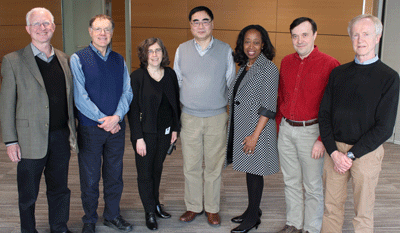 |
|
|
Newly appointed director of the high-resolution cryo-electron microscopy facility at UMMS, Chen Xu, PhD (center) is pictured at a welcome reception with (from left) C. Robert Matthews, PhD; George Witman, PhD; Celia Schiffer, PhD; Jean King, PhD; Andrei Korostelev, PhD; and Roger Craig, PhD. |
High-resolution cryo-electron microscopy, or cryo-EM, dubbed the “research method of the year” by Nature, is coming to UMass Medical School. The Massachusetts Facility for High-Resolution Cryo-Electron Microscopy will open by year’s end on the medical school’s Worcester campus. The facility will feature two state-of-the-art cryo-EM systems that will be used by a consortium of academic and commercial partners. One system is being acquired in collaboration with Harvard Medical School, supported by a grant of $5 million from the Massachusetts Life Sciences Center. The other $4 million system will be paid for by the Howard Hughes Medical Institute.
The first-of-its-kind facility in New England will be run under the direction of physicist and materials scientist Chen Xu, PhD, who is internationally recognized for his cryo-EM expertise.
“We are acquiring a technology that is transforming science. The ability to see inside the cell at the level and detail that cryo-EM makes possible opens new windows into the world of biology,” said Jean King, PhD, associate provost for biomedical research, director of the Center for Comparative Neuroimaging, and professor of psychiatry, radiology and neurology.
Cryo-EM is a breakthrough technology for visualizing the detailed structure of cells, viruses and proteins at near-atomic resolution. It has broad applications in structural biology and drug design, offering unprecedented potential to advance treatments and cures for conditions including viral and bacterial infections, Alzheimer’s disease and diabetes.
“I was enamored that one piece of equipment could help both basic scientists and translational scientists make fundamental discoveries that can translate into treatments,” said Dr. King. “The applicability across our multidisciplinary groups was immediately apparent. We knew we had to find a way to bring cryo-EM here. Our dedicated team and collaborators worked tirelessly to make that happen.”
In evaluating the potential for the technology and the multidisciplinary opportunities it offered, it became clear that a second system was necessary to meet anticipated demand for the facility. Dr. Xu was invited to lend his expertise to help secure funding from HHMI for a second machine. He was appointed associate professor of biochemistry & molecular biology and director of the Massachusetts Facility for High-Resolution Cryo-Electron Microscopy on Feb. 1.
Xu brings 30 years of electron microscopy and 15 years of cryo-EM experience to UMMS. Most recently he was at Brandeis University, where he worked with UMMS cryo-EM leadership team member Melissa Moore, PhD, Howard Hughes Medical Institute investigator, the Eleanor Eustis Farrington Chair of Cancer Research and professor of biochemistry & molecular pharmacology. Xu has also collaborated previously with other UMMS faculty, including Roger Craig, PhD, professor of cell & developmental biology. With extensive knowledge of both single-particle and electron tomography cryo-EM techniques, Xu has contributed to the development of software for automated microscope operation and the electron detectors that are currently revolutionizing the field.
“Dr. Xu is a pioneer in the field. He helped develop the technology and wants to make even greater improvements in the coming years,” said Andrei Korostelev, PhD, associate professor in the RNA Therapeutics Institute and of biochemistry & molecular pharmacology. Dr. Korostelev is a structural biologist and one of the original proponents for bringing cryo-EM to UMMS, along with Brian Kelch, PhD, assistant professor of biochemistry & molecular pharmacology; and Celia Schiffer, PhD, professor of biochemistry & molecular pharmacology and director of the Institute for Drug Resistance. “If the current standard is to record one image every three minutes, Xu will say that’s not fast enough and expensive instrument time should be spent more efficiently. He’s constantly thinking about things like that.”
The admiration is mutual. “We have the team here, from top to bottom,” said Xu, gesturing at those assembled to welcome him at a reception on March. 1. “Our vision is to advance science with a top-of-the-class operation for scientists locally, nationally and internationally.”
Other academic partners, in addition to Harvard Medical School, for the facility are UMass Amherst, UMass Dartmouth, UMass Lowell, Boston University, Hampshire College and Worcester Polytechnic Institute. Initial commercial partners include AbbVie, Novartis and Pfizer.
UMMS faculty and senior staff whose efforts have been instrumental in bringing cryo-EM to UMMS include Victor R. Ambros, PhD, the Silverman Chair in Natural Sciences and professor of molecular medicine; Terence R. Flotte, MD, the Celia and Isaac Haidak Professor of Medical Education, dean of the School of Medicine, and executive deputy chancellor and provost; C. Robert Matthews, PhD, the Arthur F. and Helen P. Koskinas Professor in Biochemistry & Molecular Pharmacology and chair and professor of biochemistry & molecular pharmacology; Craig C. Mello, PhD, Howard Hughes Medical Institute Investigator, the Blais University Professor in Molecular Medicine and distinguished professor of molecular medicine and cell & developmental biology; George B. Witman III, PhD, the George F. Booth Professor in the Basic Sciences and professor of cell & developmental biology; and Phillip D. Zamore, PhD, Howard Hughes Medical Institute Investigator, the Gretchen Stone Cook Chair in Biomedical Sciences, chair and professor of RNA therapeutics and professor of biochemistry & molecular pharmacology.
Harvard Medical School principals are Stephen C. Blacklow, MD, PhD, the Gustavus Adolphus Pfeiffer Professor of Biological Chemistry and Molecular Pharmacology and chair and professor of biological chemistry and molecular pharmacology; and Stephen C. Harrison, PhD, Howard Hughes Medical Institute Investigator and the Giovanni Armenise-Harvard Professor of Basic Medical Science.
Related link on UMassMedNow:
Massachusetts Life Sciences Center announces $5M award to UMMS for Cryo-Electron Microscope